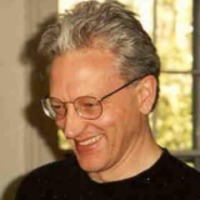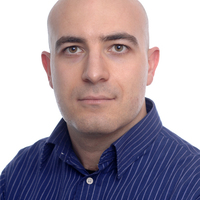
daniele de santis
- Associate Professor, Department of Philosophy and Religious Studies (úfar), Charles University
- Member of the Research Project "Intentionality and Person in Medieval Philosophy and Phenomenology” (Czech Science Foundation, GAČR 21-08256S)
- Member of the Excellence Research Project "Creativity and adaptability as conditions for the success of Europe in an interrelated world" (KREAS)
- Co-coordinator of the project "The Mediterranean Roots of the Idea of Europe (Nietzsche and the Good Europeans)" (Italian Institute for German Studies, Rome and the University of Pisa)
- PI of the Research Project "Rediscovering a German-Czech Member of Early Phenomenology: Intentionality, Consciousness and the Mind in the Philosophy of Maximilian Beck" (Czech Science Foundation, GAČR 24-10611S)
- Co-Editor in Chief of The New Yearbook for Phenomenology and Phenomenological Philosophy (Routledge)
- Italian National Habilitation as Associate Professor in Theoretical Philosophy (2022)
- Italian National Habilitation as Associate Professor in History of Philosophy (2023)
- Czech National Habilitation as Associate Professor (2023)
Address: FFUK, UFAR
nám. J. Palacha 1/2
Praha 1 (CZ)
- Member of the Research Project "Intentionality and Person in Medieval Philosophy and Phenomenology” (Czech Science Foundation, GAČR 21-08256S)
- Member of the Excellence Research Project "Creativity and adaptability as conditions for the success of Europe in an interrelated world" (KREAS)
- Co-coordinator of the project "The Mediterranean Roots of the Idea of Europe (Nietzsche and the Good Europeans)" (Italian Institute for German Studies, Rome and the University of Pisa)
- PI of the Research Project "Rediscovering a German-Czech Member of Early Phenomenology: Intentionality, Consciousness and the Mind in the Philosophy of Maximilian Beck" (Czech Science Foundation, GAČR 24-10611S)
- Co-Editor in Chief of The New Yearbook for Phenomenology and Phenomenological Philosophy (Routledge)
- Italian National Habilitation as Associate Professor in Theoretical Philosophy (2022)
- Italian National Habilitation as Associate Professor in History of Philosophy (2023)
- Czech National Habilitation as Associate Professor (2023)
Address: FFUK, UFAR
nám. J. Palacha 1/2
Praha 1 (CZ)
less
Related Authors
Daniele Nuccilli
Charles University, Prague
Barry Smith
SUNY: University at Buffalo
Guillaume Fréchette
Université de Genève
Dalius Jonkus
Vytautas Magnus University
Alexis Delamare
University College Dublin
Rodney K B Parker
Independent Researcher
Marta Albert
Universidad Rey Juan Carlos
Ronny Miron
Bar-Ilan University
Stefano Salvia
University of Pisa
InterestsView All (18)










Uploads
Papers by daniele de santis
Schapp (October 15, 1884, Großefehn–March 22, 1965, Sanderbusch) means journeying through some of the decisive milestones of the twentieth century, at least as far as the historical-philosophical sphere is concerned. Indeed, the philosopher from Aurich grew under the protective wings of crucial figures who inaugurated some of the dominant currents of thought in Germany and Europe at the beginning of the last century. These philosophers let an indelible mark on subsequent philosophical production even up to the present day: the historicism of Dilthey, the neo-Kantianism of Rickert, the phenomenology of Husserl, Pfänder, Reinach, and, alongside these, the lessons of Simmel, Lipps, and Scheler.
verstrickt, the philosopher Hermann Lübbe strives to explain the emergence
of the narratological perspective from within the phenomenological tradition
in two manners. On the one hand, Schapp is said to walk a path that is
“diametrically opposed” to “classical phenomenology”—by which Lübbe means that strand of early phenomenology that reaches its peak (Höhepunkt) in, and is paradigmatically epitomized by (among others), Adolf Reinach’s Platonism.
articulation between sensible and intelligible species provide Stein with the basis to present her own conception of intentionality (with special focus on perception): the sensible species is regarded as the correlate of the object’s Gestalt; by contrast, the intelligible species is mobilized to account for what Husserl labels noesis-noema correlation. But Stein’s ambition is also to inscribe her account of the species sensibilis within an overall (critical) interpretation of Husserl’s transcendental idealism.
Confirmed Contributors:
Rosemary R.P. Lerner
George Heffernan
Hanne Jacobs
Paul Slama
Among the many tasks that phenomenology since its first inception (and perhaps beyond) sets out to accomplish is to provide foundations for the sciences. Foundation should here be understood in a twofold sense: both that of the ontological foundation of the sciences and that of the foundation of transcendental nature. In the former case, the foundational concern is with delimiting the ontological spheres within which the empirical research moves, clarifying the mode of being and the nature of the essential structures that characterize it as well as the foundational relations between the various regions of being (nature, mind, subjective and objective spirit). One could think in this context of Husserl of course, but also of the paradigmatic significance of Edith Stein’s early writings with their attempts to ground and clarify the ontological-essential realms of psychology and historiography.
For many phenomenologists beginning with Husserl, of course, the ontological foundation cannot dispense with the transcendental one. The two must be kept distinct and yet can be neither separated nor detached from one another. The (ontological) delimitation of the different spheres and regions of being cannot be achieved except upon the basis of the phenomenological-transcendental investigation of their modes of constitution. One could also think, for example, of Oskar Becker’s work on the foundation of geometry and modal logic, of Jacob Klein’s work on the historicity of the foundation of mathematics, of the attempt undertaken by Tomoo Otaka to transcendentally ground the science of juridical-social formations, or, last but not least, of the “Copernican” turn in sociology that is proposed by Gerda Walther.
Journal Webpage: https://metodo-rivista.eu/module/pub/series.php?coll=919&about=1
In the following paper we will attempt to analyze and reconstruct Edith Stein's interpretation of Husserl's "transcendental idealism," notably, the reason why, in her opinion, the latter ended up embracing that specific philosophical position. As will soon become apparent, according to Stein, Husserl misunderstands the peculiar ontological structure of individual essences and, in particular, the specific connection with reality that they carry within themselves. Without raising the question of whether Stein's own understanding of transcendental idealism perfectly corresponds with Husserl's, we will confine ourselves to discussing, first, the wider context within which she tackles it and, second, the relation between Husserl's idealism and the formal-ontological issue of how to characterize the internal content of individual essences. No matter what we think of Stein's critical assessment, her approach has the great and undeniable merit of forcing the "interpreter" to face the problem of the tight connection between the transcendental dimension and the eidetic dimension of Husserl's thought.
Schapp (October 15, 1884, Großefehn–March 22, 1965, Sanderbusch) means journeying through some of the decisive milestones of the twentieth century, at least as far as the historical-philosophical sphere is concerned. Indeed, the philosopher from Aurich grew under the protective wings of crucial figures who inaugurated some of the dominant currents of thought in Germany and Europe at the beginning of the last century. These philosophers let an indelible mark on subsequent philosophical production even up to the present day: the historicism of Dilthey, the neo-Kantianism of Rickert, the phenomenology of Husserl, Pfänder, Reinach, and, alongside these, the lessons of Simmel, Lipps, and Scheler.
verstrickt, the philosopher Hermann Lübbe strives to explain the emergence
of the narratological perspective from within the phenomenological tradition
in two manners. On the one hand, Schapp is said to walk a path that is
“diametrically opposed” to “classical phenomenology”—by which Lübbe means that strand of early phenomenology that reaches its peak (Höhepunkt) in, and is paradigmatically epitomized by (among others), Adolf Reinach’s Platonism.
articulation between sensible and intelligible species provide Stein with the basis to present her own conception of intentionality (with special focus on perception): the sensible species is regarded as the correlate of the object’s Gestalt; by contrast, the intelligible species is mobilized to account for what Husserl labels noesis-noema correlation. But Stein’s ambition is also to inscribe her account of the species sensibilis within an overall (critical) interpretation of Husserl’s transcendental idealism.
Confirmed Contributors:
Rosemary R.P. Lerner
George Heffernan
Hanne Jacobs
Paul Slama
Among the many tasks that phenomenology since its first inception (and perhaps beyond) sets out to accomplish is to provide foundations for the sciences. Foundation should here be understood in a twofold sense: both that of the ontological foundation of the sciences and that of the foundation of transcendental nature. In the former case, the foundational concern is with delimiting the ontological spheres within which the empirical research moves, clarifying the mode of being and the nature of the essential structures that characterize it as well as the foundational relations between the various regions of being (nature, mind, subjective and objective spirit). One could think in this context of Husserl of course, but also of the paradigmatic significance of Edith Stein’s early writings with their attempts to ground and clarify the ontological-essential realms of psychology and historiography.
For many phenomenologists beginning with Husserl, of course, the ontological foundation cannot dispense with the transcendental one. The two must be kept distinct and yet can be neither separated nor detached from one another. The (ontological) delimitation of the different spheres and regions of being cannot be achieved except upon the basis of the phenomenological-transcendental investigation of their modes of constitution. One could also think, for example, of Oskar Becker’s work on the foundation of geometry and modal logic, of Jacob Klein’s work on the historicity of the foundation of mathematics, of the attempt undertaken by Tomoo Otaka to transcendentally ground the science of juridical-social formations, or, last but not least, of the “Copernican” turn in sociology that is proposed by Gerda Walther.
Journal Webpage: https://metodo-rivista.eu/module/pub/series.php?coll=919&about=1
In the following paper we will attempt to analyze and reconstruct Edith Stein's interpretation of Husserl's "transcendental idealism," notably, the reason why, in her opinion, the latter ended up embracing that specific philosophical position. As will soon become apparent, according to Stein, Husserl misunderstands the peculiar ontological structure of individual essences and, in particular, the specific connection with reality that they carry within themselves. Without raising the question of whether Stein's own understanding of transcendental idealism perfectly corresponds with Husserl's, we will confine ourselves to discussing, first, the wider context within which she tackles it and, second, the relation between Husserl's idealism and the formal-ontological issue of how to characterize the internal content of individual essences. No matter what we think of Stein's critical assessment, her approach has the great and undeniable merit of forcing the "interpreter" to face the problem of the tight connection between the transcendental dimension and the eidetic dimension of Husserl's thought.
Only a limited number of students will be admitted. Priority will be given to Master and PhD students. There will be no attendance fee.
What are the causes pushing her toward such choice? Is the account that she develops able to provide an view alternative to both Aquinas’ and Scotus’? Finally, what kind of account of the person is required in order for a realist concept of intentionality to be possibly developed?
Department of Philosophy and Religious Studies, Charles University
https://www.intentionality-person.com
In order to simplify the enrolment procedure and to comply with the covid-restrictions still in place, this edition will have a special format. Only 25 students will be admitted, and there will be no attendance fee
For more info: https://www.phenomenologyinvenice.com/2022.html
Workshop on the Philosophical Work of David Carr
David Carr (The New School for Social Research, NY)
will comment on and reply to the following contributions:
11:00 Christoph Durt (University of Vienna)
The Self and the Paradox of Subjectivity
11:45 Daniele De Santis (Faculty of Arts, Charles University)
On the Very Nature of the Transcendental.
Reflections on `The Paradox of Subjectivity‘
12:30 Jan Puc (Czech Academy of Science)
Retention as the Basis of History.
A Comment on ‘Experience and History’
13:15 Jakub Čapek (Faculty of Arts, Charles University)
Narratives and Disruptive Action of Time
In three parts, leading international scholars introduce the key themes of Schapp's philosophy, from his early writings to his mature reflections. The first part explores his phenomenology of perception and the bodily dimension of our existence in the world. Focus then moves to Schapp's philosophy of law and his ideas on the problem of value-based experience, followed lastly by his hermeneutics of stories and the narrative essence of human beings. The volume closes with an autobiographical piece by Schapp himself. Translated here in English for the first time, Schapp retrospectively outlines his position in relation to Husserl and the phenomenological school more broadly.
Crossing the divide between continental and analytic philosophy, The Philosophy of Wilhelm Schapp not only provides a fresh insight into the early development of the phenomenological tradition, but also demonstrates the relevance of Schapp's thought to recent debates in areas from the philosophy of mind to the theory of contracts.
Dilthey in Berlin, and Edmund Husserl in Göttingen, Wilhelm
Schapp (1884-1965) has, until now, been largely neglected in
phenomenological scholarship. As the first English-language
volume dedicated to Schapp’s thought, this book seeks to
correct this by investigating Schapp’s pioneering philosophy, his
relationship to his contemporaries, and what we can learn from
his work today.
In three parts, leading international scholars introduce the key
themes of Schapp’s philosophy, from his early writings to his
mature reflections. This book explores his phenomenology of
perception and the bodily dimension of our existence in the world.
It also focuses on Schapp’s philosophy of law, his ideas on the
problem of value-based experience, his hermeneutics of stories,
and the narrative essence of human beings. The volume closes
with an autobiographical piece by Schapp himself, translated here
in English for the first time, where Schapp retrospectively outlines
his position in relation to Husserl and the phenomenological
school more broadly.
Crossing the divide between continental and analytic philosophy,
The Philosophy of Wilhelm Schapp not only provides a fresh
insight into the early development of the phenomenological
tradition, but also demonstrates the relevance of Schapp’s thought
to recent debates in areas from the philosophy of mind to the
theory of contracts.
1: Celebrating Wilhelm Schapp, In Geschichten verstrickt (Edited by Daniele Nuccilli)
2: Theodor Conrad and the early phenomenological tradition (Edited by Daniele De Santis)
https://www.newyearbook-phenomenology.com
Indeed, the editors of the book are led by the conviction that a fruitful dialogue between medieval philosophy and 20th century phenomenology may prove useful in addressing questions and problems that are still relevant in contemporary debates. The book is divided into three sections, devoted respectively to medieval philosophy, phenomenology and some of the possible systematic and historical intersections between them.
Contributors are Sarah Borden Sharkey, Antonio Calcagno, Therese Cory, Daniele De Santis, Andrew LaZella, Dominik Perler, Giorgio Pini, Francesco Valerio Tommasi, Anna Tropia, and Ingrid Vendrell Ferran.
https://www.routledge.com/The-New-Yearbook-for-Phenomenology-and-Phenomenological-Philosophy-Volume/Hopkins-De-Santis/p/book/9781032562810
tratteggiata da Nietzsche in alcuni suoi scritti sia stata presa e ripresa, compresa e trasformata, impiegata o anche soltanto evocata da intellettuali, storici dell’arte, scrittori e filosofi attivi tra fine Ottocento e inizio Novecento.
Ne emerge un quadro estremamente ricco di riflessioni che intersecano metodi e approcci di studio differenti.
Konečnost patří mezi výrazné motivy soudobého myšlení i ústřední témata Pavla Kouby. Kniha přináší soubor filosofických úvah, básní, uměleckých fotografií a ohlédnutí, které vznikly u příležitosti jeho životního jubilea a pocházejí od významných českých i zahraničních autorů. Některé přímo navazují na vybrané teze Koubových textů (k pojmu pravdy, subjektu, vztahu času a prostoru či kritice morálního vidění světa) či se vymezují vůči jeho filosofické pozici vcelku, jiné se vyjadřují ke stěžejním myšlenkám pro Koubu určující filosofické tradice (fenomenologie, hermeneutika, Nietzsche). Shodně tak činí v návaznosti na to, co jejich autoři s Pavlem Koubou promýšleli a prožívali. Knihu uzavírá dialog o povaze duše mezi aristotelským a platónským filosofem, do něhož se zapojí i postava anonymního hermeneutika.
https://reviews.ophen.org/2021/01/20/daniele-de-santis-burt-hopkins-claudio-majolino-eds-the-routledge-handbook-of-phenomenology-and-phenomenological-philosophy/
- D. De Santis: "Introduction"
- C. Morel: "Lotze's Conception of Metaphysics and Science: A Middle Position in the Materialism Controversy"
- D. Manca: "L’espressione del pensiero Lotze e la confutazione di Hegel nella Logica del 1874"
- N. Milkov: "Hermann Lotze and Franz Brentano"
- M. E. Christensen: "'A halting-stage in the evolution of logical theory'. John Dewey’s critical engagement with Lotze’s logic"
- M. Vagnetti: "The Logik by Rudolf Hermann Lotze: the concept of Geltung"
- G. Iocco: "Lotze e Scheler: emotivismo e autocoscienza"
- F. Pellizzer: "Il fascino dell'ideale. Heidegger e il lotzismo di Husserl"
- R. Martinell: "Platonismo o psicologismo? La filosofia della logica di Lotze"
fase na qual a metafísica desempenha o papel de “filosofia primeira”; e uma segunda fase, na qual a metafísica é, ao contrário, identificada com o que Husserl chama de “filosofia última”.
In three parts, leading international scholars introduce the key themes of Schapp's philosophy, from his early writings to his mature reflections. The first part explores his phenomenology of perception and the bodily dimension of our existence in the world. Focus then moves to Schapp's philosophy of law and his ideas on the problem of value-based experience, followed lastly by his hermeneutics of stories and the narrative essence of human beings. The volume closes with an autobiographical piece by Schapp himself. Translated here in English for the first time, Schapp retrospectively outlines his position in relation to Husserl and the phenomenological school more broadly.
Crossing the divide between continental and analytic philosophy, The Philosophy of Wilhelm Schapp not only provides a fresh insight into the early development of the phenomenological tradition, but also demonstrates the relevance of Schapp's thought to recent debates in areas from the philosophy of mind to the theory of contracts.
Editors: Martin Klein & Michela Summa
Contributors: Laurent Cesalli & Charles Girard, Daniele De Santis & Anna Tropia, Martin Klein & Philipp Schmidt
Introduction by Martin Klein & Michela Summa